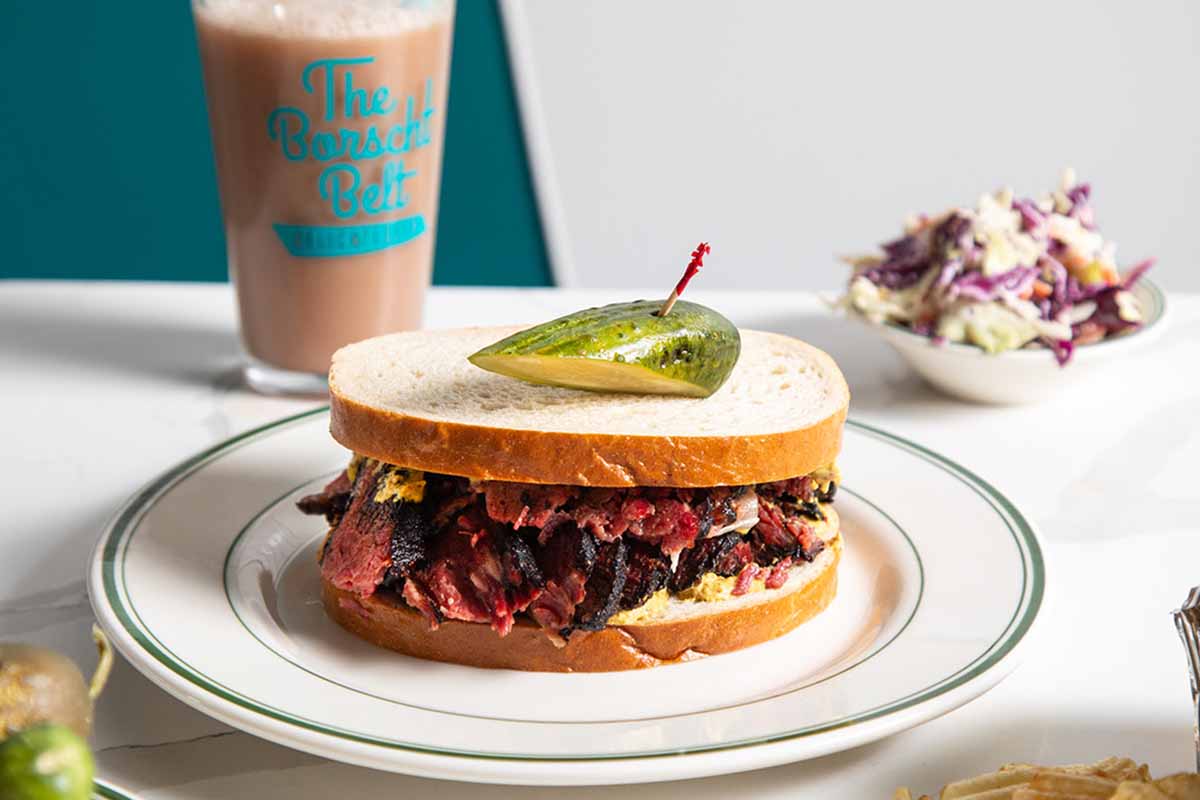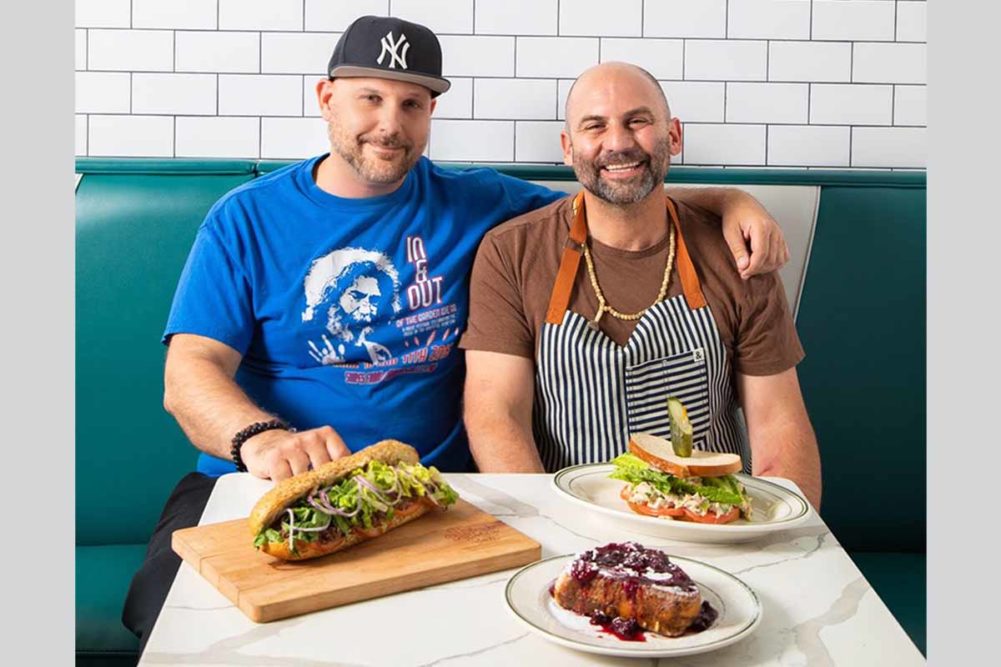On the final weekend of July, a crowd gathered in Ellenville, NY, to celebrate the legacy of The Borscht Belt, a resort area that flourished in Sullivan and Ulster counties in upstate New York at the turn of the century. The Borscht Belt featured more than 1,000 hotels, bungalow colonies, summer camps and boarding houses that dotted the Catskill Mountains from the early 20th century through the 1970s.
By the 1950s, more than a half-million people traveled to the area each year during the summer months. The bungalow colonies, hotels and other places of respite from the city helped introduce the American public to Jewish culture while helping Jews integrate into the United States via American leisure culture.
Fast-forward to 2021, when the principals of 618 Hospitality Group — Chef Nick Liberato and Michael Dalewitz — opened The Borscht Belt Delicatessen to revive a retail foodservice concept from a bygone era with a mission to preserve the traditions of Jewish delicatessens of The Borscht Belt by providing a space for diners to enjoy Jewish cuisine, music and community. The group first opened the deli in Stockton, NJ. After that, the owners relocated and reopened the retail deli in Newtown, Pa., bringing the flavors and tastes of the Jewish deli to the Philadelphia suburbs.
“This restaurant is my love letter to the Jewish Delicatessen, featuring old-school flavors with my own contemporary twist inspired by my travels and cultural experiences,” Liberato said. “Opening the Borscht Belt in 2021 in the midst of a pandemic was a very rewarding challenge, and we’re excited to take away significant experiences from that process and apply them to this bigger location in Newtown.”
Liberato was the featured celebrity chef at The Borscht Belt Fest in Ellenville, serving up his RPG sandwich — an original Borscht Belt staple featuring roast pork with char siu on garlic bread served with duck sauce, slices of chocolate Babka, traditional latkes with applesauce and Dr. Brown’s Soda.
First impressions count
The Borscht Belt Delicatessen menu features signature deli sandwiches daily, fresh bagels sourced from Ess-A-Bagel, and bialys from Shelsky’s; various platters with freshly sliced lox, a variety of smoked and pickled fish selections, spreads and salads; homemade knishes and potato latkes; award-winning fresh steamed pastrami and corned beef; Lower East Side pickles; and daily fresh baked goods including babka, rugelach, and rainbow and black-and-white cookies.
Liberato has worked in high-end restaurants for much of his career. He’s also gained notoriety after appearing on Bravo’s “Top Chef Masters,” Paramount Network’s “Bar Rescue,” and Netflix’s “Restaurants on the Edge.” The deli is a different experience, but his standards are no less exacting.
“There’s not one day here when we’re not using a slicer here,” Liberato said. “From slicing (beef) tongue to the pastrami, the corned beef, the roasted turkey — every day. I mean, we hand-slice fish. You’re only as good as how sharp your knife is. You’ve got to always make sure it’s sharper than the day before, I think in this business.
“The precision of that when we’re slicing smoked fish — I want to make sure you’re going to read the New York Times through it when you open it up at your house. It’s thin, it’s palatable and you’re hitting all those different points.”
Liberato said he is thankful for his hard-knocks education in the culinary arts as it’s helped him focus on the details that make an eating experience memorable. His background in high-end fine dining taught him that the restaurateur shoulders the responsibility to consider how execution, or preparation of a dish, will impact the experience of the guest.
“At the end of the day, I create experiences,” he said, “and I have one shot to create a great experience for a guest.”
One factor contributing to a successful experience is equipment. Operators are responsible for maintaining equipment, and in a deli where slicing meat is a daily task that means breaking it down, cleaning it and sharpening the blade every day.
“More than anything, everything has different cuts depending on what our guests’ requirements are or whether they’re eating a sandwich cold versus hot, because that makes all the difference with the palatability of how you’re eating it,” Liberato said.
Liberato said he’s doing everything he can to set up everyone on his team for success, from the purveyors that supply the deli with fresh meats to the tools team members use to execute his vision of hospitality. For example, he consulted a designer to kit out the new location with the right mix of old-school ingenuity and new-school kitchen gadgetry.
The deli has a walk-in freezer and a walk-in refrigerator. Liberato keeps small tubs of water and multiple thermometers in different zones of the refrigerator unit to ensure it’s maintaining the proper temperature.
 Visitors to the deli can see whole corned beef or pastrami being sliced for sandwiches when they walk through the door. (Source: Gab Bonghi for The Borscht Belt Delicatessen)
Visitors to the deli can see whole corned beef or pastrami being sliced for sandwiches when they walk through the door. (Source: Gab Bonghi for The Borscht Belt Delicatessen)
A place for everything
The deli also sports a 4-foot plancha, a 10-eye burner with two stoves underneath that; a double-deck oven where a lot of the deli’s meats are roasting; one fryer and one big stock burner to cook all of the chicken stocks on.
His soup stocks, by the way, are made using chicken backs and necks, celery root, garlic and other fresh ingredients; it’s an eight-hour process. The deli sells “huge amounts” of matzo ball soup to-go or to eat in-house.
“After that we end up with a lot of schmaltz (rendered chicken fat) which we mix with our chicken livers and other dishes for added flavor,” he said.
A special piece of equipment at The Borscht Belt is a pastrami steamer that Liberato had custom made and positioned up front next to the slicing areas which is part of the “show,” he said.
“So, when people walk in, they can see whole corned beef or pastrami being sliced,” he said. “Right next to that is where all our smoked fish is being sliced per pound or for sandwiches. Behind that is a beautiful old-school steamer that when you open it up, lets out the aromatics that are like the perfume of The Borscht Belt Deli.
“I go home most days smelling like pastrami, corned beef or smoked fish.”
Food safety is top-of-mind for Liberato. While living in California at one point in his career, he was responsible for four restaurants, each of which were subject to four inspections per year for a total of 16 inspections in a year.
“I’ve gone my entire life thinking every day is a health inspection,” Liberato said, which is why he insisted on having standard operating procedures (SOPs) in place at the outset of The Borscht Belt Delicatessen’s inception. SOPs at the deli include “everything from the cleaning of my steamer to the temperatures that you have to pull the pastrami or corned beef, or the training that’s behind the actual slicer and talking about the safety that has to be taken into account as well as the health precautions.”
Every task performed at the deli is done for a reason, and everything under the delicatessen’s roof is a direct reflection of the “mise en place” philosophy — it’s a French phrase referring to the system of preparation and organization in place when it’s time to cook or assemble a dish.
“When you have everything in place, ultimately, you’re executing in the proper manner,” Liberato said. “If you don’t have your mise en place right, you’re never going to be able to build your dish on your plate, or in life, the right way.”



